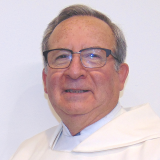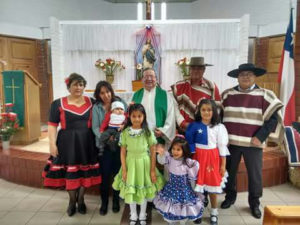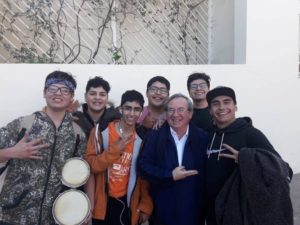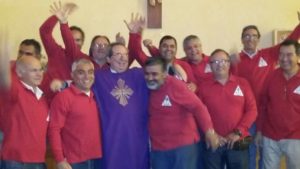I must confess that I was surprised when I received the invitation to share the meaning and value of my Viatorian religious life. Several days passed before I responded. Deep down, I accepted to write because I admire my brothers in community. What I have lived with them has impressed me for their pastoral service, their dedication, and simplicity and has helped me to find the meaning and value of my Viatorian religious life.

Fr. Gerardo Soto, CSV
A few days ago, during one of the health checks due to the coronavirus pandemic, in addition to taking my temperature, they asked me my age: ”Sixty-eight”, I replied. At one point I hesitated, wondering if I was mistaken. No, I wasn’t. That’s my age. Well, that served to deepen what I am doing with my life today and what meaning I am attaching to it. To begin with, I will say that I am a religious, a Viatorian, that I have committed myself to announce Jesus Christ and his Gospel. My religious life has transpired between formation, services within my Province, and years dedicated to education in schools, always combined with the service of collaboration with the parish priests, wherever they sent me.
I met the Viatorians when I entered the school of the recent Viatorian foundation in Viña del Mar. I was ten years old. The attraction that the young religious coming from Spain had on the students was enormous. They were captivated by their joy, enthusiasm, closeness, their social work and fraternity. In those years the country was changing. There was talk of the “revolution in freedom,” which sought to lift Chileans out of poverty. The Juniorate was opened in Puente Alto and some students, including myself, were invited to discern our vocation within the Clerics of St. Viator. What I learned in the parish and the school, my second home, soon became part of me. The doors opened for me, as I wanted to be one of them. I was discovering what filled my youthful life. It wasn’t easy, but something inside me was telling me: Make that decision! Those were happy years. They were tumultuous times: the Second Vatican Council brought great expectations. Soon the Juniorate was closed. I felt that they did not know what to do with us. They were the viatorian beginnings of a search for how to insert themselves into Chilean society. My companions left the Juniorate and I was left alone. They sent me home with the intention of sharing at the same time with the religious community of Viña del Mar. It was a strange year but full of hope.

Fr. Soto with parishioners
I began my studies in Education at the Catholic University of Valparaiso. The country was plunged into a battle for political power and a socialist government was democratically elected with Salvador Allende as president. Emotions were running high and there was talk of the “new man”. Che Guevara and the Marxist systems were gaining ground. A radical change was wanted. I was passionate about politics and at the university I participated actively. But it didn’t fulfill me. I discovered that education would bring liberation and the promotion of our people: the best service that could be done. The Viatorian mission was one hundred percent committed to it and responded to my ideals of change. Meanings and values are changing. What matters is not the meaning of life in abstract formulations, but the concrete meaning of one’s life, at a given time.
I asked to enter the novitiate. To my surprise, I was sent 14,000 kilometers away to Valladolid, Spain, where the Province’s novitiate was located. I found myself in a very different reality. A society that was also changing: It was the last years of Franco. A Church that was trying to adapt to the changes that the Second Vatican Council demanded and a Congregation that also wanted to «aggiornize “, to be updated. I was the last novice to receive “The Holy Habit” in a solemn liturgy. I think I lived the last novitiate where the “Manual of the Clerics of St. Viator” was studied, which indicated that “the end of the Congregation is the glory of God and the sanctification of its members… and the special aim, the teaching of Christian doctrine and the service of the altars”. In addition, we studied the four little books, the fruit of the 21st General Chapter of 1969. There we were told of the apostolic purpose of the Congregation: the education of the faith. In one of these documents it was already mentioned that our Congregation was going through a serious crisis: aging, and the lack of young people interested in the Viatorian vocation (Cf. N° 401 Vocation and Formation of the CSV). In the novitiate, my religious life took on new meaning and value. What I aspired to and what I was experiencing through personal effort, the grace of God and what the religious province gave me through community relations and formation, gave me meaning and made me happy. I had a future, dreams, and things to build. Life is a project and a work in progress. That project was gradually being carried out.
I returned to the country as a Cleric of St. Viator. The “road to socialism”, which had been chosen, had been abruptly aborted by a dictatorship that still has its footprints: Augusto Pinochet ruled. It was a difficult period. The people suffered and the Church was very committed to the poor and the persecuted. Our brothers accompanied the people in soup kitchens, free polyclinics, and workshops for workers and in the running of free schools. I was given the task of working with abandoned children in a boarding school that the community ran at Puente Alto. At the same time, I continued my studies at the University. My life took on meaning and I decided that I should give it to the Church in the Clerics of St. Viator. It was the best option for announcing Jesus Christ and his Gospel. I asked for perpetual vows. From here I was given things and I tried to respond to the challenges of a Viatorian Community that was beginning to be forged.
These last years have been different; the wound that the Church suffers is immense, and it is not for nothing. The entire Chilean Episcopal Conference presented its resignation to the Pope. How many priests have led a double life, no one suspected it, even those who have lived with them. Some say that it will take years to recover. In the face of the facts that we have come to know, many of us have felt disappointed. Some parishioners have stopped attending the churches. Many parishes have been emptied of young people. I was sent to Ovalle, to one of the dioceses that has been hardest hit by allegations of abuse: priests were expelled and an emblematic archbishop was reduced to the status of a layman. I left the school to serve as a parish priest. The archbishop has asked me to be his foreign vicar and spiritual director of the seminary, at a time when Chile is experiencing a social explosion never seen before, with large demonstrations in the streets; the burning of emblematic buildings, even churches; subway stations set on fire, large supermarkets looted by uncontrolled mobs; the paralysis of schools and universities; the suspension of Masses and pastoral meetings; demands of all kinds. Many ask where the Church is. I look out of one of the windows of the parish and see parishioners on the street singing, carrying banners and flags, asking for better wages, more inclusion, free and quality education and health care. What to do? There as a Viatorian I must accompany, walk with them, alongside the Church that suffers and demands better opportunities. On the other hand, the clergy is worn out, battered and has lost the credibility it once had. We formed a community of four religious in Ovalle who, in age, were on average 75. What courage! The clergy likes to visit us. And the people also feel supported by our presence. They admire our community for its hospitality, its joy and enthusiasm, for our school and parish mission. I believe that we are a sign of fraternity, of generous dedication and of hope. Yes. OF HOPE. In the midst of so much uncertainty we demonstrate a Church with a future, which believes in a better life.

Fr. Soto with a group of parents
Now, at this time of life and in times of confinement by the Coronavirus, I see things differently. New challenges appear. I value more deeply what I have; with the experience of the present moment, I begin to see, and value even more, the things of the spirit, what is really important. I do not know if it is because I am getting older, every day I find myself in a process of change: my vows and my community life acquire new meaning, I feel that I welcome my people with more joy and patience; I listen to them with more enthusiasm.
Pope Francis in one of his homilies said that sometimes we find religious, tired, discouraged, and sad, as if withered. Spiritual sadness is an illness. Sad because they do not find love, because they are not in love: in love with the Lord. They left behind a life of marriage, of family, and they wanted to follow the Lord. But now they seem to be tired… And sadness is creeping in. It is necessary to ask ourselves again: What does the Lord ask from us, from the Viatorians? Which are the peripheries that most need our presence, in order to bring them the light of the Gospel? If we do not have the joy of our vocation, who can believe that Jesus is our hope? Only our life witness will give reason for our hope in Him. The life of those of us who follow Jesus in the Viatorian vocation is the life of passionate love for Him and of apostolic zeal for people, especially for the most abandoned, the children, and the young people. If we act like this, as Pope Francis says, “When we are old or more elderly, we will have a beautiful smile and bright eyes, because we will have a soul full of tenderness, of gentleness, of mercy, of love, of fatherhood and motherhood”.
Gerardo Soto Toledo, Viatorian



